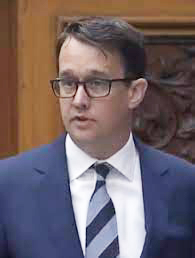Ontario passes law to protect migrant workers, help foreign-trained professionals
Ontario passes law to protect migrant workers, help foreign-trained professionals
HEALTH CARE WORKERS EXCLUDED
December 14, 2021
By Veronica Silva Cusi
LJI Reporter
The Philippine Reporter

Monte McNaughton, Ontario Labour Minister
Ontario Legislature passed last November a new law that seeks to protect the rights of the province’s workers, including highly skilled foreign-trained immigrants and temporary foreign workers.
Bill 27, which seeks to amend various laws on labour and employment, was approved on November 30 to become the Working for Workers Act, 2021. It received Royal Assent on December 2, less than two months after Ontario Labour Minister Monte McNaughton, Member of Parliament for Lambton-Kent-Middlesex, introduced the bill on October 25.
Among the laws that Working for Workers Act amends is the Employment Standards Act, 2000. The new law seeks to protect foreign workers from unlicensed temporary help agencies (THAs) or recruiters. Prospective employers and recruiters who avail of services from unlicensed recruiters or THAs can be penalized. The province is obliged to publish a list of licensed THAs or recruiters, and those whose licences have been revoked or suspended.
The new law also amends Employment Protection for Foreign Nationals Act, 2009 to protect foreign workers from being charged fees by recruiters or employers. If found to have violated the law, these recruiters and employers are liable to repay the fees.
In proposing the bill, McNaughton earlier said that the legislation “would be the toughest of its kind in Canada.”
The province has earlier proposed hiring a dedicated team of officers to crack down on illegal recruiters and recover unpaid wages of exploited workers.

MPP Lucille Collard, Ottawa-Vanier
The proposal was welcome news to foreign temporary workers in Canada (welcome news to kababayans), including those who have been victimized by illegal recruiters. But there leaves more to be desired, particularly on the publication of the list of licensed and unlicensed recruiters.
Canadian experience
For internationally trained workers, Ontario wants to do away with the contentious Canadian experience requirement that has been preventing internationally educated professionals and trades workers from practising in the province.
Ontario said the province has hundreds of thousands of occupations unfilled, yet newcomer professionals have been struggling to find jobs due to bureaucracy and red tape.
The Fair Access to Regulated Professions and Compulsory Trades Act, 2006 has been amended such that “a regulated profession shall not require as a qualification for registration that a person’s experience be Canadian experience.” An exemption may be granted, according to the new law, “for the purposes of public health and safety.”
But Ontario already said that the proposal would cover only non-health regulated professions and compulsory trades, such as professional engineers, architects, plumbers, electricians, accountants, hairstylists, teachers, and early childhood educators.
The law that received Royal Assent stated that it “applies to Skilled Trades Ontario in respect of compulsory trades as defined in the Building Opportunities in the Skilled Trades Act, 2021.”

MPP Doly Begum,
NDP’s critic for Citizenship, Foreign Credentials and
Immigration Services
Prior to the third reading of Bill 27 on November 25, the NDP’s critic for Citizenship, Foreign Credentials and Immigration Services, MPP Doly Begum, said in a press conference where she raised the “critical need” to recognize the credentials of foreign-trained health professionals particularly in light of the pandemic.
“The pandemic has shown how critical health care workers are to Ontario’s social and economic well- being, and the extent to which health care workers are in short supply,” said the Member of Provincial Parliament for Scarborough Southwest.
With the Ford government leaving out health care workers in the new legislation, Begum said they “fail to create practical pathways” for these critical health professionals.
“We are not asking for exemptions or exceptions; we are asking for a path forward. Failure to do so is negatively impacting our province and our economy,” she added.
Filipino Canadians working in the health care sector have earlier asked to be included in the proposed law.
At the debate on the third hearing of the bill, Lucille Collard, MPP for Ottawa-Vanier, said that in her riding, foreign-trained health care workers are also being “prevented from working in their fields.”
She continued: “To date, the government has not introduced any measures to allow further certification of internationally educated health care workers. This is despite the fact that nurses with foreign credentials were actually allowed to practise in Ontario because of the pandemic on a temporary basis, and they did perform their jobs up to expectations and did it well. Therefore, accepting foreign credentials in health care can assist with much-needed workforce.”
She added that not addressing health care professionals in the bill is a missed opportunity as the province currently has the “most severe labour shortage [in health care] with 38,000 vacant jobs.”
Speaking in the same debate, Begum said the bill fails to address other barriers preventing foreign-trained professionals from practising in their fields in the province. She said “discriminatory hiring practices … is one of the biggest barriers to getting employment across this province.”
“Highly educated and capable individuals are underemployed and deskilled—not to mention the opportunity cost for our province,” she added.
Comments (0)